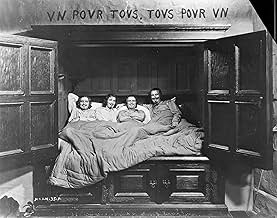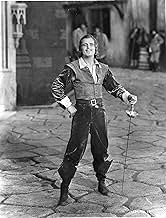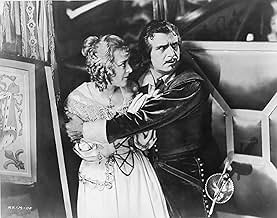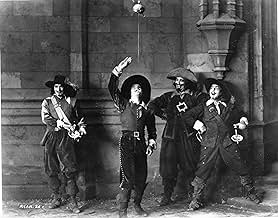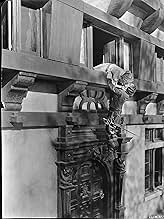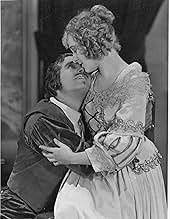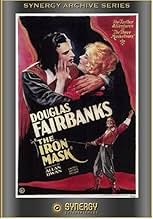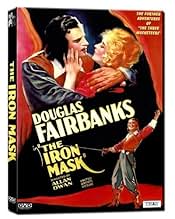CALIFICACIÓN DE IMDb
7.0/10
1.5 k
TU CALIFICACIÓN
Un mosquetero ayuda a separar a los príncipes gemelos, criando a uno en secreto. Años después, el príncipe exiliado regresa para reclamar el trono, encarcelando a su hermano con una máscara ... Leer todoUn mosquetero ayuda a separar a los príncipes gemelos, criando a uno en secreto. Años después, el príncipe exiliado regresa para reclamar el trono, encarcelando a su hermano con una máscara de hierro, obligando al mosquetero a actuar.Un mosquetero ayuda a separar a los príncipes gemelos, criando a uno en secreto. Años después, el príncipe exiliado regresa para reclamar el trono, encarcelando a su hermano con una máscara de hierro, obligando al mosquetero a actuar.
- Dirección
- Guionistas
- Elenco
- Premios
- 2 premios ganados en total
Tiny Sandford
- Porthos
- (as Stanley Sandford)
Edgar Caldwell
- Undetermined Secondary Role
- (sin créditos)
Fred Cavens
- DeRochefort's Ruffian
- (sin créditos)
Opiniones destacadas
Early silent swashbuckling with talking sequences , starred by a master swordsman , Douglas Fairbanks, defending the French king from a scheme involving substitution by a lookalike . This is an epic retelling about the durable Alexandre Dumas's novel and is set in 17th century French court . In St Germain , on fifth of September , 1638 , public excitement ran high in anticipation of an important event , there was born the royal heir . As twins brothers -the same actor playing a double role- , separated at birth, one become in Louis XIV of France and the other is banished . The latter returns and unjustly imprisons his brother , being forced to wear an iron mask that hides his identity . Both of whom are sons of the Queen mother Anna of Austria . Later on , the real king is jailed by his tyrannical brother in an isolated castle and is hidden his identity wearing the iron mask but his existence threatens the reigning . But there is a friendship that is born of God , it is not altered by time , nor affected by circumstance , it endures to the grave and beyond . Four musketeers whose friendship has become a legend to stir the hearts of men and shouting ¨One for all and all for one¨. Straightforward as well as gallant D'Artagnan and the three musketeers scheme a plan to free him clashing against a malicious Richelieu , the Louis XIV's favorite and his hoodlum Rochefort . As the kidnapped king is eventually rescued by the musketeers and takes place a royal vengeance .
It's an excellent rendition from the immortal novel with quite budget and spectacular action . The picture contains rousing scenes , intrigue , derring-do , exciting swordplay , romantic adventure , mayhem , a lot of fun and is pretty entertaining . It's a silent movie with two brief speeches by Douglas Fairbanks at the beginning and intermission . In this film, the Four Musketeers - Athos, Porthos, Aramis, and D'Artagnan - all sleep together in one bed, with the French phrase 'Un Pour Tous, Tous Pour Un' , One For All, All For One, inscribed on the headboard. This entire production was under the supervision of Maurice Leloir , member of the Society of French Artists , illustrator of the Three Musketeers , the acknowledged authority on the period depicted . Marvelous casting with a magnificent Douglas Fairbanks as a valiant swashbuckler . Charming Douglas Fairbanks steals the show when he bounds and leaps , flies and run ; in addition he is the screenwriter of this rollicking adventure . Fairbanks executes athletic feats , moving sword-play and spectacular acrobatics similarly he demonstrated in other classics such as The Mark of Zorro (1920), Robin Hood (1922), Three musketeers , Don Q Son of Zorro , The gaucho , The iron mask , The Taming of the Shrew , Don Juan , Mr Robinson , among others . Douglas performed most of the stunts in his films himself. He was an excellent athlete and used his physical abilities to his best advantage. Douglas was king of Hollywood by that time and he formed his own production company ; during a Liberty Bond tour with Charles Chaplin he fell in love with Mary Pickford with whom he, Chaplin and Griffith had formed United Artists in 1919. Lush production design is well reflected on the luxurious interiors and exteriors . The motion picture was lavishly produced and well realized by Allan Dwan .The realization is fairly exciting , thanks largely to filmmaker Allan Dwan's fair play and achieving a masterly style by skillful lighting .
This classy story is subsequently remade several versions , for both TV and the big screen . Firstly this mute rendition (1929) , after that , ¨The man in the iron mask¨ by James Whale(1939) with Louis Hayward , Alan Hale and Joan Bennet , ¨The Fifth Musketeer¨(1979) by Ken Annakin with Beau Bridges , Rex Harrison , Silvia Kristel , Ursula Andress ; ¨Iron mask¨(1997) by William Richert with Timothy Bottoms , Edward Albert , James Gammon , Dana Barron , Meg Foster and finally ¨The man in the iron mask¨ (1998) , a big production by Randall Wallace with Leonardo DiCaprio , Gerard Depardieu , John Malkovich , Jeremy Irons . And TV adaptation of the classy ¨Iron mask¨ (1977) by Mike Newell with Richard Chamberlain , Jenny Agutter , Ian Holm , Ralph Richardson .
It's an excellent rendition from the immortal novel with quite budget and spectacular action . The picture contains rousing scenes , intrigue , derring-do , exciting swordplay , romantic adventure , mayhem , a lot of fun and is pretty entertaining . It's a silent movie with two brief speeches by Douglas Fairbanks at the beginning and intermission . In this film, the Four Musketeers - Athos, Porthos, Aramis, and D'Artagnan - all sleep together in one bed, with the French phrase 'Un Pour Tous, Tous Pour Un' , One For All, All For One, inscribed on the headboard. This entire production was under the supervision of Maurice Leloir , member of the Society of French Artists , illustrator of the Three Musketeers , the acknowledged authority on the period depicted . Marvelous casting with a magnificent Douglas Fairbanks as a valiant swashbuckler . Charming Douglas Fairbanks steals the show when he bounds and leaps , flies and run ; in addition he is the screenwriter of this rollicking adventure . Fairbanks executes athletic feats , moving sword-play and spectacular acrobatics similarly he demonstrated in other classics such as The Mark of Zorro (1920), Robin Hood (1922), Three musketeers , Don Q Son of Zorro , The gaucho , The iron mask , The Taming of the Shrew , Don Juan , Mr Robinson , among others . Douglas performed most of the stunts in his films himself. He was an excellent athlete and used his physical abilities to his best advantage. Douglas was king of Hollywood by that time and he formed his own production company ; during a Liberty Bond tour with Charles Chaplin he fell in love with Mary Pickford with whom he, Chaplin and Griffith had formed United Artists in 1919. Lush production design is well reflected on the luxurious interiors and exteriors . The motion picture was lavishly produced and well realized by Allan Dwan .The realization is fairly exciting , thanks largely to filmmaker Allan Dwan's fair play and achieving a masterly style by skillful lighting .
This classy story is subsequently remade several versions , for both TV and the big screen . Firstly this mute rendition (1929) , after that , ¨The man in the iron mask¨ by James Whale(1939) with Louis Hayward , Alan Hale and Joan Bennet , ¨The Fifth Musketeer¨(1979) by Ken Annakin with Beau Bridges , Rex Harrison , Silvia Kristel , Ursula Andress ; ¨Iron mask¨(1997) by William Richert with Timothy Bottoms , Edward Albert , James Gammon , Dana Barron , Meg Foster and finally ¨The man in the iron mask¨ (1998) , a big production by Randall Wallace with Leonardo DiCaprio , Gerard Depardieu , John Malkovich , Jeremy Irons . And TV adaptation of the classy ¨Iron mask¨ (1977) by Mike Newell with Richard Chamberlain , Jenny Agutter , Ian Holm , Ralph Richardson .
THE IRON MASK (United Artists, 1929), directed by Allan Dwan, based on "The Man in the Iron Mask" by Alexander Dumas, a sequel to Dumas's THE THREE MUSKETEERS (United Artists, 1921), both starring Douglas Fairbanks as D'Artagnan and Marguerite De La Motte as Constance, is a worthy farewell to Fairbanks making his final silent screen adventure.
Those familiar with the plot, which was remade several times on screen and television, including THE MAN IN THE IRON MASK (United Artists, 1939) with Louis Hayward, and/ or the most recent and satisfactory 1998 featuring Leonardo DiCaprio and Jeremy Irons, will find the story here not much different, but only shorter in its basic format, as is with its title. The story begins with King Louis XIII of France (Rolfe Sedan) receiving the news of the birth of his son, the future heir to the throne. The only problem is that the heir also has a twin. Since there cannot be two heirs, this news must be kept in utmost secrecy and anyone involved must be put away forever. Constance Beaucieux (Marguerite De La Motte), D'Artagnan's (Douglas Fairbanks), beloved, who was the midwife during the birth, is immediately put away in the Convent of Martes by orders of Count De Rochefort (Ullrich Haupt). Unaware of the secret, D'Artagnan tries to rescue Constance from being held prisoner against her will, but arrives too late. She has been stabbed by Milady De Winter (Dorothy Revier) after discovering the secret mark on her shoulder, the brand of a common criminal. Before Constance dies in D'Artagnan's arms, she utters her final words to him, "the other one ..." The death of Constance leaves D'Artagnan feeling empty and bitter. D'Artagnan, who has been reunited with his colleagues, The Three Musketeers, later saves them from being executed by orders of the Cardinal Richelieu (Nigel De Brulier). After D'Artagnan rescues Richelieu from De Rochefort's men, the Musketeers are pardoned, but find they must part company once more when D'Artagnan is appointed as guardian to the newborn infant and sent to Spain while the actual heir to the throne remains in France. Some twenty years later, the evil twin brother (William Bakewell), a spoiled young man, eventually learns his true identity and of his twin brother holding the throne in France from the villainous De Rochefort. The evil twin plots to take over the throne by having his brother abducted, and banishing him by having him locked in a dungeon with his face sealed in an iron mask for all eternity, and being given food from the guards from under the door, and with strict orders for him not to ever have any visitors. While taking control of the throne, the evil twin meets with his mother, Queen Anne (Belle Bennett), who immediately realizes what's happening. It is then up to the D'Artagnan and his musketeers, now older men, to reunite and save the day.
Featured in the supporting cast are Stanley Sanford as Porthos; Leon Bary as Athos; Gino Corrado as Aramis; Vera Lewis as Madame Peronne and Gordon Thorpe playing the boy prince and his evil twin.
A satisfactory version that becomes a bit slow going at times due to a couple of flashbacks, but then picks up speed again with a memorable swashbuckling conclusion. THE IRON MASK was first introduced as part of the 12-week series on public television's THE SILENT YEARS (1975), hosted by Lillian Gish. Because this was Fairbanks' final silent adventure, released the final year of the silent era (1929), THE IRON MASK became the film chosen as the closing chapter to this series. Accompanied with an original piano score by William J. Perry, from the Paul Killiam collection, and running at the length of about 87 minutes, THE IRON MASK also consisted of color tinted scenes. Reportedly distributed theatrically with talking sequences, sound effects and an original musical score (which may still exist today), THE IRON MASK was later reissued in 1952 through Odyssey Pictures, eliminating the original title cards, replaced with narration by Douglas Fairbanks Jr., and accompanied by a new orchestral score. Available with the excellent Perry piano score on video cassette through Blackhawk Films in the 1980s, current video copies distributed in the 1990s present THE IRON MASK with its 1952 72 minute reissue format, the version which formerly aired on American Movie Classics from 1997-1998. Although the difference being the length and clearer picture quality, with the narration giving a better outlook and understanding to the storyline, silent film buffs would prefer to see THE IRON MASK restored to its original silent format. Thanks to KINO video, it's own copy has been restored with sound prologue with Doug Fairbanks himself as well as an orchestral score by Carl Davis. HO-LA! (***)
Those familiar with the plot, which was remade several times on screen and television, including THE MAN IN THE IRON MASK (United Artists, 1939) with Louis Hayward, and/ or the most recent and satisfactory 1998 featuring Leonardo DiCaprio and Jeremy Irons, will find the story here not much different, but only shorter in its basic format, as is with its title. The story begins with King Louis XIII of France (Rolfe Sedan) receiving the news of the birth of his son, the future heir to the throne. The only problem is that the heir also has a twin. Since there cannot be two heirs, this news must be kept in utmost secrecy and anyone involved must be put away forever. Constance Beaucieux (Marguerite De La Motte), D'Artagnan's (Douglas Fairbanks), beloved, who was the midwife during the birth, is immediately put away in the Convent of Martes by orders of Count De Rochefort (Ullrich Haupt). Unaware of the secret, D'Artagnan tries to rescue Constance from being held prisoner against her will, but arrives too late. She has been stabbed by Milady De Winter (Dorothy Revier) after discovering the secret mark on her shoulder, the brand of a common criminal. Before Constance dies in D'Artagnan's arms, she utters her final words to him, "the other one ..." The death of Constance leaves D'Artagnan feeling empty and bitter. D'Artagnan, who has been reunited with his colleagues, The Three Musketeers, later saves them from being executed by orders of the Cardinal Richelieu (Nigel De Brulier). After D'Artagnan rescues Richelieu from De Rochefort's men, the Musketeers are pardoned, but find they must part company once more when D'Artagnan is appointed as guardian to the newborn infant and sent to Spain while the actual heir to the throne remains in France. Some twenty years later, the evil twin brother (William Bakewell), a spoiled young man, eventually learns his true identity and of his twin brother holding the throne in France from the villainous De Rochefort. The evil twin plots to take over the throne by having his brother abducted, and banishing him by having him locked in a dungeon with his face sealed in an iron mask for all eternity, and being given food from the guards from under the door, and with strict orders for him not to ever have any visitors. While taking control of the throne, the evil twin meets with his mother, Queen Anne (Belle Bennett), who immediately realizes what's happening. It is then up to the D'Artagnan and his musketeers, now older men, to reunite and save the day.
Featured in the supporting cast are Stanley Sanford as Porthos; Leon Bary as Athos; Gino Corrado as Aramis; Vera Lewis as Madame Peronne and Gordon Thorpe playing the boy prince and his evil twin.
A satisfactory version that becomes a bit slow going at times due to a couple of flashbacks, but then picks up speed again with a memorable swashbuckling conclusion. THE IRON MASK was first introduced as part of the 12-week series on public television's THE SILENT YEARS (1975), hosted by Lillian Gish. Because this was Fairbanks' final silent adventure, released the final year of the silent era (1929), THE IRON MASK became the film chosen as the closing chapter to this series. Accompanied with an original piano score by William J. Perry, from the Paul Killiam collection, and running at the length of about 87 minutes, THE IRON MASK also consisted of color tinted scenes. Reportedly distributed theatrically with talking sequences, sound effects and an original musical score (which may still exist today), THE IRON MASK was later reissued in 1952 through Odyssey Pictures, eliminating the original title cards, replaced with narration by Douglas Fairbanks Jr., and accompanied by a new orchestral score. Available with the excellent Perry piano score on video cassette through Blackhawk Films in the 1980s, current video copies distributed in the 1990s present THE IRON MASK with its 1952 72 minute reissue format, the version which formerly aired on American Movie Classics from 1997-1998. Although the difference being the length and clearer picture quality, with the narration giving a better outlook and understanding to the storyline, silent film buffs would prefer to see THE IRON MASK restored to its original silent format. Thanks to KINO video, it's own copy has been restored with sound prologue with Doug Fairbanks himself as well as an orchestral score by Carl Davis. HO-LA! (***)
In Kevin Brownlow and David Gill's extraordinary 1980 documentary about the silent era "Hollywood" the final sequence of "The Iron Mask" is described as Fairbanks' farewell to the silent film. And it is.
Generally this is an inferior film to the amazing 1921 "Three Musketeers". Allan Dwan is not the visual stylist that Fred Niblo is, and so "The Iron Mask" becomes much more of a straightforward action film. But as such it is splendid. I think we tend to forget what a good actor Fairbanks was. His emotional journey here is quite powerful as he faces the death of his lady and of his friends - and he ages convincingly as well.
Most of the cast is different to the "Three Musketeers" but Margueritte de la Motte returns as Constance and the unforgettable Nigel de Brulier again plays Richilieu with extreme venom.
Fairbanks has an athletic field day as well. There seem to be a number of versions of this film around. The one I saw ran 95 minutes and had tinted sequences. I've seen some advertised as having talking sequences, and others with narration by Douglas Fairbanks Jr - the one i saw had neither of these.
It was probably the last large scale silent feature made in Hollywood. And that is what gives those gorgeous last minutes such power. The silent era was truly the golden years of Hollywood and Fairbanks was its king - in this film he sadly abdicates.
Generally this is an inferior film to the amazing 1921 "Three Musketeers". Allan Dwan is not the visual stylist that Fred Niblo is, and so "The Iron Mask" becomes much more of a straightforward action film. But as such it is splendid. I think we tend to forget what a good actor Fairbanks was. His emotional journey here is quite powerful as he faces the death of his lady and of his friends - and he ages convincingly as well.
Most of the cast is different to the "Three Musketeers" but Margueritte de la Motte returns as Constance and the unforgettable Nigel de Brulier again plays Richilieu with extreme venom.
Fairbanks has an athletic field day as well. There seem to be a number of versions of this film around. The one I saw ran 95 minutes and had tinted sequences. I've seen some advertised as having talking sequences, and others with narration by Douglas Fairbanks Jr - the one i saw had neither of these.
It was probably the last large scale silent feature made in Hollywood. And that is what gives those gorgeous last minutes such power. The silent era was truly the golden years of Hollywood and Fairbanks was its king - in this film he sadly abdicates.
Seven stars. My twelve year-old son and I both LOVE Douglass Fairbanks. I showed
him Zorro when he was about four, and he's been hooked ever since. But this
one was a bit of a let-down. I guess Fairbanks was finally starting to get too
old to pull off the sort of stunts that litter films like Zorro, The Three
Musketeers, The Black Pirate, and Thief of Bagdad. There are the occasional
nuggets, and the film is still chock full of bravura action sequences. But
it's a film about the inevitable consequence of aging, even if it's done up in
Hollywood gloss. This film was made at the cusp of the arrival of talkies, and
features intro and entr'acte sequences with Fairbanks, as D'Artagnan, talking
to the audience. That provided a fun opportunity for me to discuss the
limitations of early sound technology with my son, and about why big spectacle
films stayed silent longer than small-scene dramas. Anyway. The film is a
combo of the Dumas novels Twenty Years After and The Man in the Iron Mask,
using both to put a more upbeat spin on the later novel. It has excellent
production values, and a solid cast. The acting is first-rate silent film
acting -- everything HAS to be big to work, and it is. The stunts are
well-done, if not breath taking. It works best if seen as a sort of coda to
the stuff Fairbanks had been doing so brilliantly for the previous dozen years
or so. 8 November 2021.
This is without a doubt, the best version of Dumas' classic work on celluloid. Every time I see the ending, my eyes mist, especially as I realize we're seeing Fairbanks'last silent work, which makes it all the more touching. Allan Dwan was a master, and an unappreciated one. This is more than likely his finest work, and one that doesn't seem to get its proper due. It's a tale of camaraderie, love of country, and . . . well heck, it's doing the right thing. Today's cinematic 'heroes' just don't do that any more.
There are no fiery explosions, four-letter words, car crashes, etc., but the action is wonderful. The humor is magnificent, and the script id done well. If you want to show a silent film to someone who's never seen one, this is the one to show them. (Then, after they've loved it, show them a Lon Chaney or DeMille's KING OF KINGS.)
There are no fiery explosions, four-letter words, car crashes, etc., but the action is wonderful. The humor is magnificent, and the script id done well. If you want to show a silent film to someone who's never seen one, this is the one to show them. (Then, after they've loved it, show them a Lon Chaney or DeMille's KING OF KINGS.)
¿Sabías que…?
- TriviaIn the prologue the four musketeers stand in a framing device, as a medieval stage booth, and D'Artagnan steps forward and speaks to the audience, then steps back and resumes his position with the other three, who remained motionless; after the mid-point intermission, the same situation is repeated, with D'Artagnan speaking again to the audience, finishing with the words, "once more, once more . . . ", after which the film resumes with the title card "20 years later". These were the first lines of dialogue ever spoken on film by Douglas Fairbanks, in his last silent film.
- ErroresThe iron-masked King languishes in his tower prison and notices a fisherman in the sea below. He quickly scratches a message on a pewter platter and tosses it out of the window to the rocks below. The fisherman picks up the place and READS the message - at that time in history the (oppressed) French working class were illiterate.
- Versiones alternativasThe 1999 restored version (near 104 minutes) by Kino Video, has the original speeches by d'Artagnan, the title cards, but a new musical score by Carl Davis, played by the City of Prague Philharmonica Orchestra. The restored version is distributed by Kino Video and Photoplay Productions.
- ConexionesFeatured in Hollywood (1980)
- Bandas sonorasOne for All, All for One
(1929) (uncredited)
Lyrics by Jo Trent
Music by Hugo Riesenfeld and Louis Alter
Selecciones populares
Inicia sesión para calificar y agrega a la lista de videos para obtener recomendaciones personalizadas
- How long is The Iron Mask?Con tecnología de Alexa
- Watch this film online
Detalles
Taquilla
- Total en EE. UU. y Canadá
- USD 3,270,000
- Tiempo de ejecución1 hora 45 minutos
- Mezcla de sonido
Contribuir a esta página
Sugiere una edición o agrega el contenido que falta

Principales brechas de datos
What is the English language plot outline for The Iron Mask (1929)?
Responda
